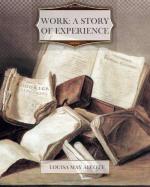With words like these, poor Helen clung to Christie; and, soul and body, Christie devoted herself to the afflicted girl. She would not see her mother; and the unhappy woman haunted that closed door, hungering for the look, the word, that never came to her. Augustine was her consolation, and, during those troublous days, the priest was forgotten in the son. But Harry was all in all to Helen then; and it was touching to see how these unfortunate young creatures clung to one another, she tenderly trying to keep him from the wild life that was surely hastening the fate he might otherwise escape for years, and he patiently bearing all her moods, eager to cheer and soothe the sad captivity from which he could not save her.
These tender ministrations seemed to be blessed at last; and Christie began to hope the haunting terror would pass by, as quiet gloom succeeded to wild excitement. The cheerful spirit of the season seemed to reach even that sad room; and, in preparing gifts for others, Helen seemed to find a little of that best of all gifts,—peace for herself.
On New Year’s morning, Christie found her garlanding her lover’s picture with white roses and the myrtle sprays brides wear.
“These were his favorite flowers, and I meant to make my wedding wreath of this sweet-scented myrtle, because he gave it to me,” she said, with a look that made Christie’s eyes grow dim. “Don’t grieve for me, dear; we shall surely meet hereafter, though so far asunder here. Nothing can part us there, I devoutly believe; for we leave our burdens all behind us when we go.” Then, in a lighter tone, she said, with her arm on Christie’s neck:
“This day is to be a happy one, no matter what comes after it. I’m going to be my old self for a little while, and forget there’s such a word as sorrow. Help me to dress, so that when the boys come up they may find the sister Nell they have not seen for two long years.”
“Will you wear this, my darling? Your mother beads it, and she tried to have it dainty and beautiful enough to please you. See, your own colors, though the bows are only laid on that they may be changed for others if you like.”
As she spoke Christie lifted the cover of the box old Hester had just brought in, and displayed a cashmere wrapper, creamy-white, silk-lined, down-trimmed, and delicately relieved by rosy knots, like holly berries lying upon snow. Helen looked at it without a word for several minutes, then gathering up the ribbons, with a strange smile, she said:
“I like it better so; but I’ll not wear it yet.”
“Bless and save us, deary; it must have a bit of color somewhere, else it looks just like a shroud,” cried Hester, and then wrung her hands in dismay as Helen answered, quietly:
“Ah, well, keep it for me, then. I shall be happier when I wear it so than in the gayest gown I own, for when you put it on, this poor head and heart of mine will be quiet at last.”




